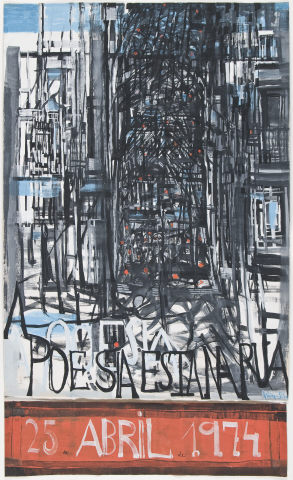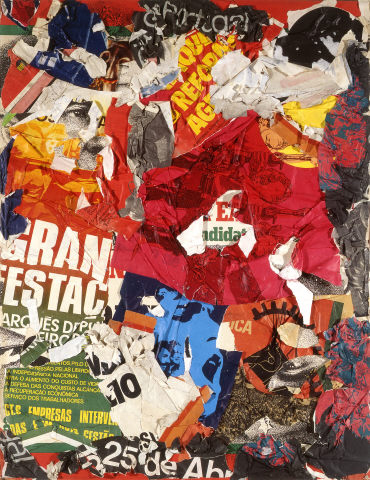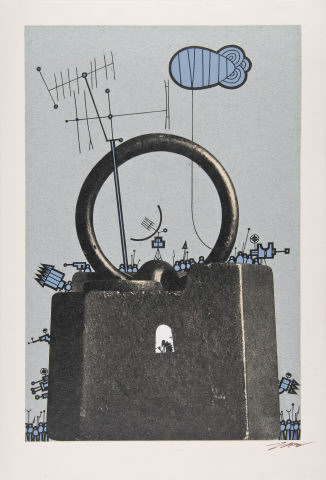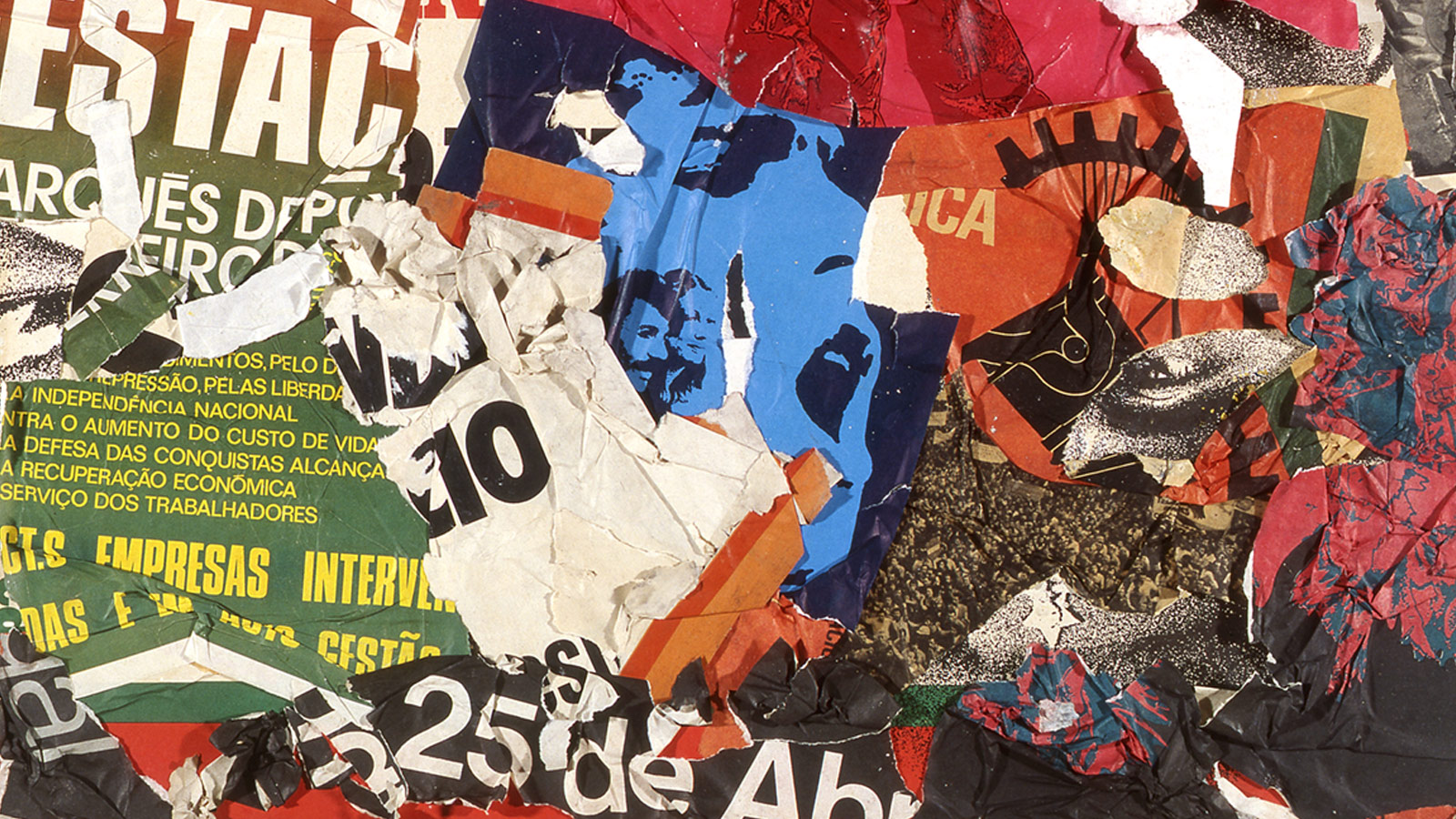The Carnation Revolution in five works from CAM’s Collection chosen by the Youth Advisory Group
In these texts, some members of CAM’s Youth Advisory Group share their thoughts and emotions, reflecting on what the Revolution really means to five young people who live it every day without having lived through it.
Ema Gonçalves

‘My grandmother, who was one of seven siblings, began serving at the age of nine, having completed the third grade in three months. Her mother was fired from the factory where she worked because she was pregnant, and her father was disabled due to an accident at work. She went hungry, emigrated, saw her relatives’ graves defaced due to their association with communism. Her first vote was for Álvaro Cunhal in memory of her parents and everything that she had lived through. The fact that I am here today, as a queer female PhD student, is thanks to democracy, freedom and the 50th anniversary of the Carnation Revolution. But the cornerstones of society – peace, food, housing, health and education – are yet to be attained, and no house can stand without a good foundation. There are 50 far-right MPs in parliament; women’s and LGBT+ rights are under threat; genocide is happening in Palestine; the list goes on.
The revolution, like Ana Hatherly’s, is not static. Today I’m celebrating 25 April in honour of my grandmother and all those like her, but I’m still fighting for the April that remains to be achieved, the April that was never completed and the April that has not yet been imagined, for us and for all those who will come afterwards.’
Joel Moreira

‘Minha família, nha manus, minha kamba, hau nia maun alin, nha ermons. I hope they meet. Teach us of the spirit of revolution. Teach us that, like a fish trying to survive out of water, to be the revolution is suffocating. That it’s always mourning while fighting against memory. When will you tell us that to revolutionise is having no other option? That it’s not a voluntary act, but one of necessity? Amar bhai, daju, mi phral. I hope they meet. Tell us about all the revolutions you take on from the moment of waking up. All the invisible struggles against a discourse that dehumanises you. When will you share this spirit, so we still have a chance? Only then can we understand that there is no point in commemorating the Carnation Revolution if we cannot call upon it today. Be the wind that blows away the great narrative that erodes the spirit of struggle, that reduces the term ‘revolution’ to a mere mechanism devoid of meaning, that tries to see in the past an escape from the present. My family, when should we tell them that the 25 April was not the beginning, much less the end, of our suffocation?’
From a young black man, who misses you greatly. See you in the stars.
Leonor Rosas

‘The transition to democracy wasn’t a smooth one. It wasn’t even a simple coup d’état. Call it a revolution, because that’s what it was. The ultimate creative act – a poem that took to the streets. That big R-word, almost 50 years old now, encapsulates a many-voiced dream, the work of thousands of hands, sown in the collective fields, in the workers’ factories, in the outraged women and the young people who were no longer prepared to die in the war. They no longer needed rhymes, verses of equal length and tidy metre. In the Revolution we are – as a collective – a disorder of rules, a hopeful horizon broken open with the heft of our shoulders, and a figure whose outline is blurred, its contours unpicked. Even as it grows older, the word persists, frightening those who want it tamed and swept under the carpet, like a moment of youthful madness never to be repeated. But it holds the gift of eternal rejuvenation. It’s that idea that never goes away. Its voice – sometimes low, sometimes shrill – is always echoing at the back of our mind, where we stow away our hopes and dreams. It is an assault on the heavens, the trembling earth, the first day, the open door, the red triangle that vanquishes the white circle. Or maybe it’s none of these things. The revolution is never what people say it is, it’s always something else. And that something else is beautiful.’
Leopoldina Fekayamãle

‘FORWARD!
Revolutions always tell us to look forward, to march with hope and strength, so that we can change the inequalities of the present and build equitable and better futures for all. In this sense, I think that revolution and art are perfect partners. When I saw this work by Ana Hatherly, I thought, “This is the one – let’s move forward!” We need to keep going and never give up.
The Carnation Revolution was heavily influenced by the struggles of the African movements for liberation from Portuguese colonial rule. The demands of these movements intersected with those of Portuguese citizens under the dictatorship. In both cases, the freedom that followed was only possible because people didn’t give up, didn’t give in and believed in change.
I see this as one of the most valuable lessons of the Revolution: not giving in and continuing the fight. Even when everything around us seems to say that there is little point in continuing, even when we see the far right advancing, Palestine bleeding, the Congo in pain, and so many other conflicts around the world, we need to find our strength and not give in. We can only bring about the revolutions that our times demand with our fists raised and our heads held high. Forward!’
Vicente Megre

‘I’m taking this work, ‘Prisoneiro!’ by João Abel Manta, as my starting point and reflecting on what is still keeping my generation ‘Prisoner!’ 50 years after the Carnation Revolution.
We were bequeathed an inalienable duty to be free, but it’s up to us to find the right way to do it.
Freedom of expression was won, but the freedom not to express oneself has been forgotten.
The eagerness to be free leads to the inevitable polarisation of forced expressionism.
As our supposed individual freedoms encroach on each other, we seek to imprison our disputants, cancelling each other out for fear of trampling on the freedom of a majority.
That same freedom weighs heavily upon us in a world where publishing is now the domain of the public, but deep reflection the preserve of a select few.
The dynamism of today’s world has made time the ultimate weapon for freedom, the carnation of a generation that gets bored with videos longer than 15 seconds and voices opinions as fast as it can type.
A generation that wants too much, too fast – hostage to a misguided freedom, prisoner of accelerated time…’


